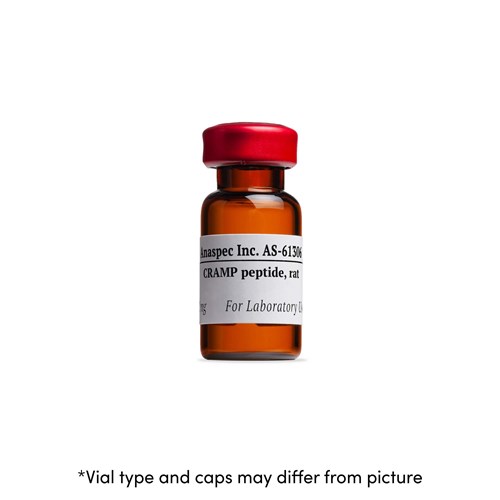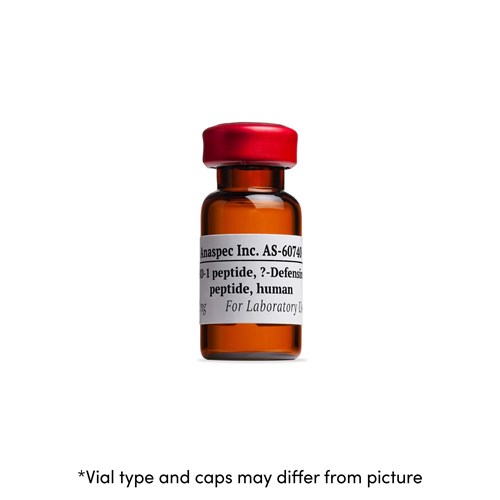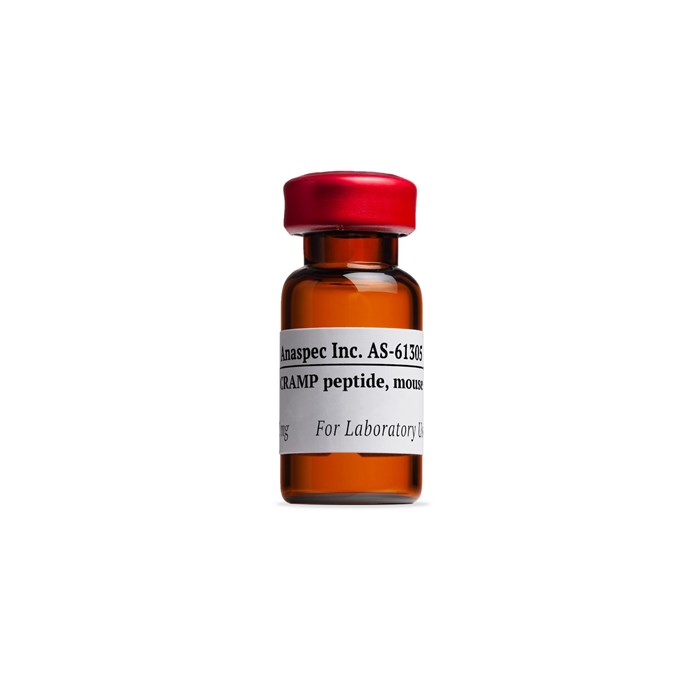CRAMP, mouse - 1 mg
- Cat.Number : AS-61305
- Manufacturer Ref. :
-
Availability :
In stock
Alternative choices
This cathelicidin-related antimicrobial peptide (mCRAMP) is the sole murine cathelicidin. mCRAMP expression in the intestinal tract is restricted to surface epithelial cells in the colon. mCRAMP shows antimicrobial activity against the murine enteric pathogen Citrobacter rodentium and destroys skin Candida albicans.
Specifications
| Chemistry | |
| Sequence one letter code |
|
|---|---|
| Sequence three letter code |
|
| CAS registry number |
|
| Molecular Formula |
|
| Molecular Mass/ Weight |
|
| Modification | |
| Conjugation |
|
| Quantity & Purity | |
| Purity |
|
| Storage & stability | |
| Form |
|
| Storage Conditions |
|
| Activity | |
| Biomarker Target | |
| Research Area | |
| Sub-category Research Area | |
| Usage |
|
| Source | |
| Source / Species |
|
Downloads
You may also be interested in the following product(s)


Citations
Cationic antimicrobial peptides serve as activation signals for the Salmonella Typhimurium PhoPQ and PmrAB regulons in vitro and in vivo.
Front Cell Infect Microbiol. . 2012 Jul 27 ; 2 102 | DOI : 10.3389/fcimb.2012.00102
- SM. Richards
Fluorescence and UV Resonance Raman Study of Peptide−Vesicle Interactions of Human Cathelicidin LL-37 and Its F6W and F17W Mutants
Biochemistry. . 2009 Dec 01 ; 48(47) 11264 | DOI : 10.1021/bi900996q
- JE. Gable
Toxins and antimicrobial peptides: interactions with membranes
Proc SPIE Int Soc Opt Eng. . 2009 Aug 21 ; 7397 pii73970J | DOI : 10.1117/12.827439
- DE. Schlamadinger
Nafcillin enhances innate immune-mediated killing of methicillin-resistant Staphylococcus aureus.
J Mol Med . 2013 Dec 03 ; 92(2) 139 | DOI : 10.1007/s00109-013-1100-7
- G. Sakoulas
β-Defensins activate human mast cells via Mas-Related Gene X2.
J Immunol . 2013 May 22 ; 191(1) 345 | DOI : 10.4049/jimmunol.1300023.
- H. Subramanian
Mammalian antimicrobial peptide influences control of cutaneous Leishmania infection.
Cell Microbiol . 2011 Apr 28 ; 13(6) 913 | DOI : 10.1111/j.1462-5822.2011.01589.x.
- MM. Kulkarni
Plasmacytoid dendritic cells sense skin injury and promote wound healing through type I interferons
J Exp Med . 2010 Nov 29 ; 207(13) 2921 | DOI : 10.1084/jem.20101102
- J. Gregorio
Fluorescence and UV resonance Raman study of peptide−vVesicle interactions of human cCathelicidin LL-37 and its F6W and F17W mutants
Biochem . 2009 Dec 01 ; 48(47) 11264 | DOI : 10.1021/bi900996q.
- JE. Gable
Induction of group A Streptococcus virulence by a human antimicrobial peptide.
PNAS . 2008 Oct 28 ; 105(43) 16755 | DOI : 10.1073/pnas.0803815105
- I. Gryllos
References
Anti-Fungal Activity of Cathelicidins and their Potential Role in Candida albicans Skin Infection
J Invest Dermatol. . 2005 Jul 01 ; 125(1) 108 | DOI : https://doi.org/10.1111/j.0022-202X.2005.23713.x
- B. Lopez-Garcia
- et al
Cathelicidin Mediates Innate Intestinal Defense against Colonization with Epithelial Adherent Bacterial Pathogens
J Immunol . 2005 Apr 15 ; 174(8) 4901 | DOI : https://doi.org/10.4049/jimmunol.174.8.4901
- M. Limura
- et al

